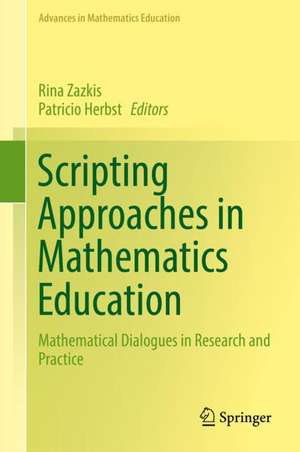Scripting Approaches in Mathematics Education: Mathematical Dialogues in Research and Practice: Advances in Mathematics Education
Editat de Rina Zazkis, Patricio Herbsten Limba Engleză Hardback – 9 noi 2017
This book shows how the practice of script writing can be used both as a pedagogical approach and as a research tool in mathematics education. It provides an opportunity for script-writers to articulate their mathematical arguments and/or their pedagogical approaches. It further provides researchers with a corpus of narratives that can be analyzed using a variety of theoretical perspectives.
Various chapters argue for the use of dialogical method and highlight its benefits and special features. The chapters examine both “low tech” implementations as well as the use of a technological platform, LessonSketch. The chapters present results of and insights from several recent studies, which utilized scripting in mathematics education research and practice.
| Toate formatele și edițiile | Preț | Express |
|---|---|---|
| Paperback (1) | 571.84 lei 38-44 zile | |
| Springer International Publishing – 22 iun 2018 | 571.84 lei 38-44 zile | |
| Hardback (1) | 656.43 lei 6-8 săpt. | |
| Springer International Publishing – 9 noi 2017 | 656.43 lei 6-8 săpt. |
Din seria Advances in Mathematics Education
- 15%
 Preț: 648.24 lei
Preț: 648.24 lei - 18%
 Preț: 905.06 lei
Preț: 905.06 lei - 15%
 Preț: 660.04 lei
Preț: 660.04 lei - 18%
 Preț: 959.98 lei
Preț: 959.98 lei - 15%
 Preț: 642.51 lei
Preț: 642.51 lei - 15%
 Preț: 661.97 lei
Preț: 661.97 lei - 15%
 Preț: 657.57 lei
Preț: 657.57 lei - 24%
 Preț: 1337.45 lei
Preț: 1337.45 lei - 20%
 Preț: 581.64 lei
Preț: 581.64 lei - 15%
 Preț: 665.58 lei
Preț: 665.58 lei - 15%
 Preț: 653.14 lei
Preț: 653.14 lei - 24%
 Preț: 647.52 lei
Preț: 647.52 lei - 18%
 Preț: 1127.28 lei
Preț: 1127.28 lei - 18%
 Preț: 1129.02 lei
Preț: 1129.02 lei - 15%
 Preț: 656.89 lei
Preț: 656.89 lei - 18%
 Preț: 786.04 lei
Preț: 786.04 lei - 18%
 Preț: 1024.53 lei
Preț: 1024.53 lei - 18%
 Preț: 1134.06 lei
Preț: 1134.06 lei - 24%
 Preț: 842.56 lei
Preț: 842.56 lei - 18%
 Preț: 898.26 lei
Preț: 898.26 lei - 18%
 Preț: 957.62 lei
Preț: 957.62 lei - 24%
 Preț: 991.36 lei
Preț: 991.36 lei - 18%
 Preț: 950.33 lei
Preț: 950.33 lei - 18%
 Preț: 1009.54 lei
Preț: 1009.54 lei - 18%
 Preț: 1013.96 lei
Preț: 1013.96 lei - 24%
 Preț: 790.70 lei
Preț: 790.70 lei - 24%
 Preț: 797.37 lei
Preț: 797.37 lei
Preț: 656.43 lei
Preț vechi: 772.26 lei
-15% Nou
Puncte Express: 985
Preț estimativ în valută:
125.60€ • 131.50$ • 103.93£
125.60€ • 131.50$ • 103.93£
Carte tipărită la comandă
Livrare economică 05-19 aprilie
Preluare comenzi: 021 569.72.76
Specificații
ISBN-13: 9783319626918
ISBN-10: 3319626914
Pagini: 425
Ilustrații: XIX, 425 p. 104 illus.
Dimensiuni: 155 x 235 mm
Greutate: 0.86 kg
Ediția:1st ed. 2018
Editura: Springer International Publishing
Colecția Springer
Seria Advances in Mathematics Education
Locul publicării:Cham, Switzerland
ISBN-10: 3319626914
Pagini: 425
Ilustrații: XIX, 425 p. 104 illus.
Dimensiuni: 155 x 235 mm
Greutate: 0.86 kg
Ediția:1st ed. 2018
Editura: Springer International Publishing
Colecția Springer
Seria Advances in Mathematics Education
Locul publicării:Cham, Switzerland
Cuprins
On Dialogue and Stories as Representations of Practice: Introduction to the book, Patricio Herbst.- Combining Geometrical Transformations: A meta-mathematical narrative, John Mason.- Constructing Plausible, but Uncommon Stories: Gaining subversive insight into the school mathematics tradition, Dan Chazan and Shoshana Gilead.- A Tale of Two Digital Games: How discussion can augment personal narratives, Anne Watson and John Mason.- Who is right? - What students' and prospective teachers' responses to scripted dialog reveal about their conceptions of proof, Orly Buchbinder.- Moving Toward Approximations of Practice in Teacher Professional Development: Learning to summarize a problem-based lesson, Gloriana González.- How Can Designed Reference Points in an Animated Classroom Story Support Teachers’ Study of Practice? Vu Minh Chieu, Wendy Rose Aaron, and Patricio Herbst.- “I understand” Talk in Script Writing: A case from Euclid’s Elements, Boris Koichu & Rina Zazkis.- Teachers Unpack Mathematical Conventions via Script-writing, Igor Kontorovich.- Interjecting Scripting Studies into a Mathematics Education Research Program: The case of zero-divisors and the zero-product property, Dov Zazkis and John Paul Cook.- Eyes, ears, and expectations: Scripting as a multi-lens tool, Ami Mamolo.- Generating, Appraising and Revising Representations of Mathematics Teaching with Prospective Teachers, Sandra Crespo.- Does the Medium Matter? A Comparison of Secondary Mathematics Preservice Teachers’ Representations of Practice Created in Text and Storyboarding Media, Annick Rougee and Patricio Herbst.- Preservice Teachers’ Learning Paths of Classroom Discourse through Scripting, Woong Lim, Deborah Roberts-Harris and Hee-Jeong Kim.- What StoryCircles can do for Mathematics Teaching and Teacher Education, Patricio Herbst and A. Milewski.- Dialogues on Dialogues: The use of classical dialogues in mathematics teacher education, Rina Zazkis and Boris Koichu.- On the Use of Dialogues: Looking back and looking forward, Rina Zazkis.
Textul de pe ultima copertă
This book shows how the practice of script writing can be used both as a pedagogical approach and as a research tool in mathematics education. It provides an opportunity for script-writers to articulate their mathematical arguments and/or their pedagogical approaches. It further provides researchers with a corpus of narratives that can be analyzed using a variety of theoretical perspectives.
Various chapters argue for the use of dialogical method and highlight its benefits and special features. The chapters examine both “low tech” implementations as well as the use of a technological platform, LessonSketch. The chapters present results of and insights from several recent studies, which utilized scripting in mathematics education research and practice.
Caracteristici
Illuminates scripting approached in mathematics education research and practice Enriches task design in teacher education and undergraduate mathematics education Presents key characteristics of several tools such as StoryCircle and Depict Suggests additional avenues for using scripting in the classroom and beyond
